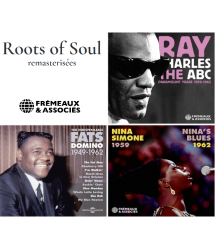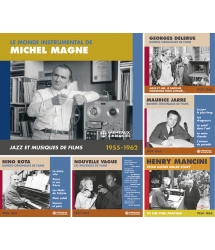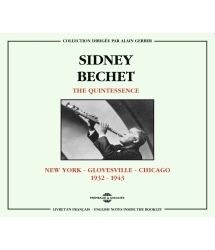Sidney Bechet made a strong impression on those around him, not only for his wonderful clarinet and soprano saxophone playing but also for his antagonistic, mean-spirited personality ; Born in New Orleans sometime before the turn of the century, he was proclaimed « an artist of genius » as early as 1919 by conductor Ernest Ansermet. Bechet was on the move for much of his career, and the Creole musician made nearly as many enemies as he did records. He performed with contemporaries such as Louis Armstrong and Jelly Roll Morton as well as formed his own group, The New Orleans Feetwarmers. Sadly, he felt misunderstood and could only articulate himself through his music. Before his death in 1960, he wrote, « Me, I want to explain myself so bad. I want to have myself understood. And the music, it can do that. The music, it’s my whole story. » Sidney Bechet : The Quintessence (1932-43) is yet another very fine and comprehensive two-disc collection in Frémeaux & Associés’ The Quintessence series spotlightting the careers of major jazz artists. Like many great jazz musicians, Sidney Bechet was a virtuoso on his instrument(s) as well as a top-flight composer. A compositiion he co-wrote, entitled « When The Sun Sets Down South, » begins the first disc. From the bouncing piano to the superb horn section with « Pops » Bechet leading the way on soprano sax, you know you are in for a swinging good time. On « Blackstick », Bechet takes his turn on clarinet with the amply named Noble Sissle & His Swingsters. Although Bechet may have had a reputation for being a difficult man, there is an undenialble beauty and joyous quality to his music. Songs such as « Jungle Drums, » with its wild loud drums and strong raspy blend of soprano and baritone saxophones, and « Chant in the Night » are brimming over with infectious rhythm. He was also aqually adept with other misicians’ compositions, from the melodic slow blues of fellow clarinet player Milton « Mezz » Mezzrow’s « Really the Blues » to « Indian Summer », wich brings to mind a feeling of nostalgia on a lazy summer afternoon, and finally « Dear Old Southland ». This beautifull rendition of a classic jazz standard is a luminous ballad featuring a shimmering soprano saxophone solo that at the very conclusion becomes an upbeat foot stomper. The exhilarating « China Boy » begins the second half of the collection. Bechet’s mastery is further illustrated here with his complex rapid-fire delivery which is interrupted briefly with a soft bass solo and an ever-so-delicate guitar. Also of note are Billie Holiday’s timeless « Strange Fruit », wherein Bechet’s soprano saxophone deftly susbstitutes fot the great singer’s melancholy voice, the self-penned and very soulful « Blues in the Air », a rare vocal turn from Bechet on « Make Me a Pallet on the Floor », « Rose Room », and Cole Porter’s « What is this Things Called Love ». Winding up the sets is « After You’ve Gone », a tune that starts as the slow lament of a broken-hearted lover and changes midway into a celebration of new-found freedom, and Louis Armstrong’s famous « When It’s Sleepy Time Down South », with conjures up images of Southern folks dozing of on the front porch on a hot day. Even though Sidney Bechet : The Quintessence covers the years 1932-1943, the bulk of the recordings were made during the period 1938-1941. Nevertheless, these compact discs exemplify his musical gifts and lasting impact on the jazz world. Duncan REID-THIRTEENTH MOON MAGAZINE











